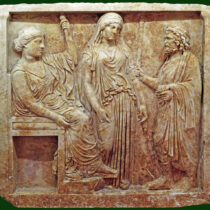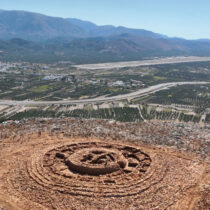Antonio Corso, The Birth and Development of the Idealized Concept of Arcadia in the Ancient World, Archaeopress, Oxford 2022, 188 pages. ISBN 978-1-80327-164-4 ISBN 978-1-80327-165-1 (e-Pdf).
“The prevailing narration about classical Greece focused the organization of the community in the institution of the polis as the salient aspect of this civilization, with its constitution and its representative organizations: the citizen had to take part to the life of the polis and even be ready to die. The democratic form of government received a particular emphasis in the contemporary scholarly world.
“On the contrary this book illustrates the other face of this coin: the desire to escape from the community, the love for loneliness, the opposition to the polis in favor of mountains, groves and meadows.
“The negative concept of the polis is found already in Hesiod and then in the Fables attributed to Aesop: the community is represented as full of persons who are determined to harm you, with institutions occupied by dishonest men, who are easily corrupted.
“This picture contrasts that of the world far from cities, which gives peace and joy to the soul. Moreover there you find sacred landscapes, the deities who inhabit these territories, appealing Nymphs pamper you.
“In this context, the figure of the shepherd becomes crucial, already in a poem attributed to Stesichorus: while the herds are busy browsing on the grass in the meadows, the shepherd may seat under the shadow of a tree, playing his musical instruments, composing poems and sporting with love.
“The mythical paradigm of the sanitizing power of mountains and streams of Arcadia is constituted, already in the Archaic period, by the story of the daughters of Proetus who become mad at Argos but are healed in Arcadia, in the sanctuary of Artemis of Lusoi.
“The importance of mountains of Arcadia becomes quite clear in the poems of Pindar and Bacchylides: it is a region inhabited by Pan. Moreover Bacchylides narrates in detail the myth of the Proetides and gives emphasis to the healing power of Artemis of Lusoi.
“The above outlined concept is oligarchic in concept: based on the contempt of people inhabiting cities as well as of their institutions.
“The notion of Arcadia as ideal habitat of meadows and groves is found in few vase paintings of the first half of the 4th c. BC: for example in representations of Kallisto while she is about to be transformed into a she bear, on a rocky mountain among groves (figs. 1-2, see also figs. 3 and 4) in a territory which probably coincides with the Arcadian sanctuary of Artemis Kalliste.
“The manifesto of the Arcadian dream is constituted by a picture of Apelles which is known thanks to a copy from Herculaneum (fig. 5): the ruling lady of this land, probably to be identified with personified Arcadia, seats on a rocky mountain. Her sovereignty and power are emphasized by the scepter which she holds in her left.
“Under her, a hind nourishes the baby Telephus, while an eagle suggests that the territory is sacred to Zeus, Heracles and the lion of Nemea evoke another mythical memory of this region.
“Pan also appears in this wall painting: he plays his syrinx, thus revealing another aspect of the Arcadian happiness, which consists in the musical creativity. Finally a basket full of fruit in the painting exalts the abundance of these lands.
“This picture probably represents the mountainous area at the border between the territory of Tegea and Argolid and may have been commissioned by Tegea in the third quarter of the 4th c. BC: it is meant to declare the excellence of this land and represents it as a world of gods and heroes, moreover powerful and wealthy.
“The consecration of the Arcadian dream as a poetical pattern is due to the poetess Anyte of Tegea who around 300 BC represents the pastoral world around Tegea as a gentle serene environment: everything which is mean and gloomy is not found in this magic world.
“In this book the Arcadian dream is followed through the Hellenistic period until its adoption by Rome which promotes it because the same Rome was regarded an Arcadian foundation established by Evander of Pallantion”.
Antonio Corso
















